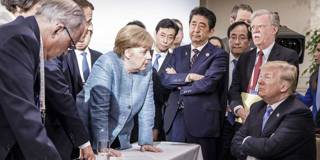Although the COVID-19 pandemic has stricken every country, global leadership in responding to the crisis has remained woefully absent. Multilateral cooperation will be essential, but in the meantime, national governments must orient their domestic policies toward global goals.
JAKARTA – This year, the world experienced a global crisis unlike anything seen in generations. The COVID-19 pandemic is indiscriminate and unprecedented in scale, and has exposed pervasive weaknesses in health systems, emergency preparedness, and multilateral coordination. Though the coronavirus is primarily a health issue, it remains a multidimensional crisis.
Owing to the sheer complexity of the pandemic’s fallout, policymakers at all levels have been confronted with unprecedented challenges. Governments have had to strike a balance between protecting lives and livelihoods, and maintaining fiscal space and avoiding higher debt burdens. During these extraordinary times, the trade-offs between speed, accuracy, and effectiveness in policymaking have become widely apparent.
Though most national governments have responded to the crisis in a similar overall fashion, the effectiveness of policies has varied widely across countries, reflecting differences in political leadership, institutional capacity, decision-making processes, and other factors. Robust and inclusive health-care systems, emergency preparedness, and social safety nets have all played a critical role. In the future, these systems, along with sound macroeconomic policy and available fiscal space, will allow countries to respond faster and more effectively to similar shocks.

JAKARTA – This year, the world experienced a global crisis unlike anything seen in generations. The COVID-19 pandemic is indiscriminate and unprecedented in scale, and has exposed pervasive weaknesses in health systems, emergency preparedness, and multilateral coordination. Though the coronavirus is primarily a health issue, it remains a multidimensional crisis.
Owing to the sheer complexity of the pandemic’s fallout, policymakers at all levels have been confronted with unprecedented challenges. Governments have had to strike a balance between protecting lives and livelihoods, and maintaining fiscal space and avoiding higher debt burdens. During these extraordinary times, the trade-offs between speed, accuracy, and effectiveness in policymaking have become widely apparent.
Though most national governments have responded to the crisis in a similar overall fashion, the effectiveness of policies has varied widely across countries, reflecting differences in political leadership, institutional capacity, decision-making processes, and other factors. Robust and inclusive health-care systems, emergency preparedness, and social safety nets have all played a critical role. In the future, these systems, along with sound macroeconomic policy and available fiscal space, will allow countries to respond faster and more effectively to similar shocks.